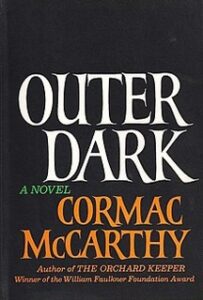
Outer Dark
By Cormac McCarthy
256 pages
Originally published Sept. 12, 1968
Released in paperback June 29, 1993
This was the January selection for The Mules, my always amusing and superbly insightful reading group here in Delray Beach. We’ve been at it for at least a dozen years. Which means (given our penchant for occasionally reading two books a month) we have read and discussed close to 200 books, about half of them novels.
When we are united in liking an author, we will read two or three books by him/her. For example, we’ve read two of Yuval Harari’s books, several by Malcolm Gladwell, several by Michael Lewis, three of Hemingway’s novels, and several by Cormac McCarthy. Outer Dark was, I think, our third McCarthy.
Cormac McCarthy has published 12 novels. The first, The Orchard Keeper, was published in 1965. Outer Dark, I was surprised to learn, was his second novel, published in 1968. (The year I graduated high school!) As a second book, Outer Dark could have been a sophomore failure. And the early reviews were mixed. But today, some critics believe it to be one of his best.
I liked it very much. I read it once and was once again enchanted by the rawness and liveliness of McCarthy’s prose. Then I listened to it on tape and enjoyed it for its story.
Plot: It’s about Rinthy, a woman who bears her brother’s child and then sets out to find it (if it is still alive) after she discovers that her brother lied when he told her that it had died while she was sleeping.
Themes: The McCarthy standards – the ruthlessness of nature, the underrated human capacity for evil, the extreme difficulty of leading a moral life.
Interesting: The title came from the Gospel of Matthew. Specifically, the meeting between the Roman centurion and Jesus, when Jesus says: “But the children of the kingdom shall be cast out into outer darkness: there shall be weeping and gnashing of teeth.” The story is peppered with other Biblical themes. And as GG, one of our regular members, pointed out, there are also many allusions to Greek tragedies.
Critical Reception
Though some early reviewers complained about McCarthy’s “increasingly dense style and sometimes arcane vocabulary,” most were good. A few examples:
* “Cormac McCarthy’s second novel, Outer Dark, combines the mythic and the actual in a perfectly executed work of the imagination. He has made the fabulous real, the ordinary mysterious.” (Thomas Lask, The New York Times)
* “There is no way to overstate the power, the absolute literary virtuosity, with which McCarthy draws his scenes.” (Walter Sullivan, Sewanee Review)
The first few paragraphs of the book…
SHE SHOOK HIM awake into the quiet darkness. Hush, she said. Quit hollerin.
He sat up. What? He said. What?
She shook him awake from dark to dark, delivered out of the clamorous rabble under a black sun and into a night more dolorous, sitting upright and cursing beneath his breath in the bed he shared with her and the nameless weight in her belly.
